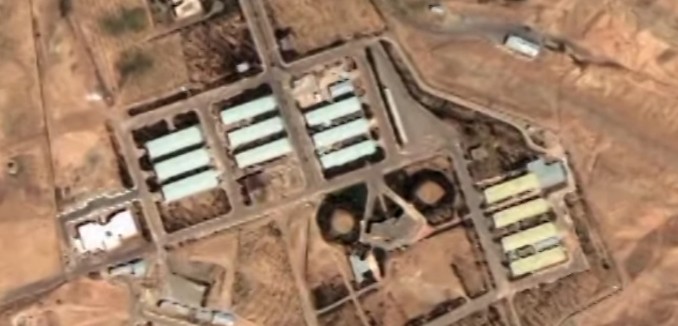The International Atomic Energy Agency’s investigation into Iran’s past nuclear research at the Parchin military site must remain open due to Iran’s lies to the agency, a leading nuclear research think tank wrote in a report (.pdf) published Thursday.
The report, written by David Albright and Serena Kelleher-Vergantini of the Institute for Science and International Security, observed that the IAEA investigation’s findings contradicted Iran’s claim that a critical building was only used for storing chemical explosives. The report also notes that the IAEA “found chemically man-made particles of natural uranium,” which the IAEA couldn’t explain definitively, and which suggested “that Iran conducted high explosive work on a uranium deuteride neutron initiator at Parchin.”
The report summed up its findings:
Since Iran did not seriously cooperate with the investigation, including detailing what actually occurred at the site, and the IAEA’s discovery of uranium particles, the IAEA requires a continuation of its Parchin investigation. It should be granted a mandate from the Board of Governors in its upcoming resolution stating its authority to conduct additional visits to Parchin, take additional, in-person samples, and interview persons of interest it identifies as having worked on past efforts. The Parchin file can in no way be considered closed. It should remain open and the IAEA should continue its investigation into the activities that took place at the site. It is time that Iran starts to admit what really happened at Parchin.
A complete investigation into Iran’s research at the Parchin site is essential to learning the full scope of its past illicit nuclear activity. This is crucial to establishing verification of Iran’s compliance with the nuclear deal that was announced in July.
Transparency in the history of Iran’s nuclear and nuclear-weapons research “is seen as not just another issue – say, one that Iran could refuse to trade away by making concessions in other areas – but as a prerequisite to verifying Iranian compliance across all issues,” Omri Ceren wrote in The Tower last year.
Because “extensive evidence” existed to suggest that Iran had an illicit nuclear weapons program, Armin Rosen of Business Insider wrote on Tuesday, the IAEA needed to be able “to identify key personnel, facilities, supply chains, and past activities to establish exactly how far along Iran’s weaponization activities really are and to recognize whether those activities have been restarted.”
But it was reported earlier this week that the administration would not require Iran to come clean about its past nuclear work.
Emily Landau, a senior research fellow at the Institute for National Security Studies, explained in an analysis for The Tower earlier this week why it was so essential to keep the IAEA investigation open:
As the P5+1 move to implement the Iran deal, the IAEA report – however lukewarm – must not be ignored, because it does break Iran’s narrative of having done no wrong in the nuclear realm. Iranian officials should no longer be allowed to appear on prominent platforms throughout the world – like the Munich Security Conference early this year – and continue to spread their narrative of nuclear innocence without being firmly challenged. Iran cannot be permitted to raise ideas and initiatives in international forums about dealing with other states from a position of having been cleared of all suspicion. The international community must be firm in its rebuttal: Iran actually has done wrong in the nuclear realm by working on a military nuclear capability for decades. All measures taken against it were legal in the face of its blatant NPT violations. Iran may have succeeded in securing a good deal from its perspective, but its history must not be whitewashed or ignored.
[Photo: JewishNewsOne / YouTube ]




